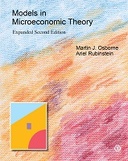Explore

Models in Microeconomic Theory
Martin Osborne and Ariel Rubinstein
2023
0 Ungluers have
Faved this Work
Login to Fave
Models in Microeconomic Theory covers basic models in current microeconomic theory. Part I (Chapters 1-7) presents models of an economic agent, discussing abstract models of preferences, choice, and decision making under uncertainty, before turning to models of the consumer, the producer, and monopoly. Part II (Chapters 8-14) introduces the concept of equilibrium, beginning, unconventionally, with the models of the jungle and an economy with indivisible goods, and continuing with models of an exchange economy, equilibrium with rational expectations, and an economy with asymmetric information. Part III (Chapters 15-16) provides an introduction to game theory, covering strategic and extensive games and the concepts of Nash equilibrium and subgame perfect equilibrium. Part IV (Chapters 17-20) gives a taste of the topics of mechanism design, matching, the axiomatic analysis of economic systems, and social choice.
The book focuses on the concepts of model and equilibrium. It states models and results precisely, and provides proofs for all results. It uses only elementary mathematics (with almost no calculus), although many of the proofs involve sustained logical arguments. It includes about 150 exercises.
With its formal but accessible style, this textbook is designed for undergraduate students of microeconomics at intermediate and advanced levels.
This book is included in DOAB.
Why read this book? Have your say.
You must be logged in to comment.
Rights Information
Are you the author or publisher of this work? If so, you can claim it as yours by registering as an Unglue.it rights holder.Downloads
This work has been downloaded 65 times via unglue.it ebook links.
- 65 - pdf (CC BY-NC-ND) at Unglue.it.
Keywords
- axiomatic analysis of economic systems
- basic models
- Economic Theory & Philosophy
- Economics
- Economics, finance, business & management
- equilibrium
- Game theory
- matching
- Mechanism Design
- microeconomic theory
- models of an economic agent
- Social choice
- Social research & statistics
- Society & Social Sciences
- Sociology
- Sociology & anthropology
- Textbook
- thema EDItEUR::J Society and Social Sciences::JH Sociology and anthropology::JHB Sociology::JHBC Social research and statistics
- thema EDItEUR::K Economics, Finance, Business and Management
- thema EDItEUR::K Economics, Finance, Business and Management::KC Economics::KCA Economic theory and philosophy
- undergraduate students
Links
DOI: 10.11647/OBP.0361Editions

